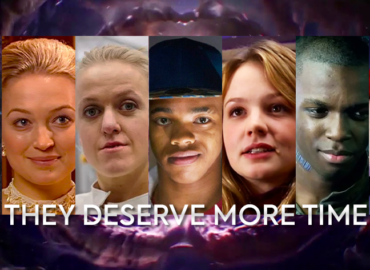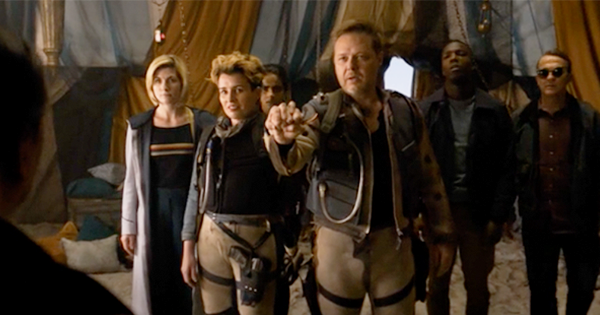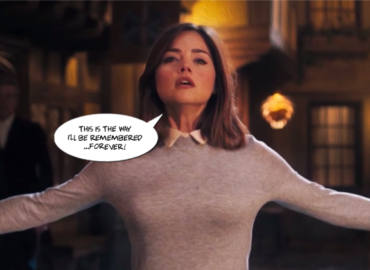If you were to take on a writing prompt asking you to compose a five-line scene where two well-known literary characters address a mundane event like a car that won’t start, and then asked another writer to do the same, the odds are extremely high that very little of those brief compositions would bear any resemblance other than the components that adhered to the original guideline. Even within such a microcosmic scope, the number of variables that define a fictional story is so large, the possible results are virtually infinite. Scale that variance to the n-th degree, now, and consider the 52-year, multiple-media realm of Doctor Who lore (and dare we say, canon). The breadth of established content is massive, growing larger by the day, and any writer saddled with creating an engaging and entertaining story that remains true to the characters and respectful of that canon is in for a Herculean effort. Add a dash of critical and prolific curative fans on forums and social media, and the analogy of the writer ‘under the microscope’ (dare we say, miniscope?) intensifies.
This week, the GPR staff looks at efforts by Doctor Who writers and producers to adhere to continuity in a program based on time travel, pseudo-science, and identity change. We look at the walls between canon and creative freedom, the perils of paradoxes, and whether or not it’s worth worrying about writing your successors into a corner.
News Links:
- Tom Baker Loops Doctor Who Further Into Star Wars Canon (In a Sense)
- Chibnall Gains Matt Strevens as Co-Executive Producer in Series 11
- Bill Anderson Confirmed As Director For Series 10
Podcast: Play in new window | Download | Embed
Subscribe: Apple Podcasts | Spotify | RSS







Finally, I guess after some days after waiting, the internet is finally letting my listen to this podcast.
3:34 – With continuity errors, I personally don’t get “up and arms” about it. I remember that this is a show centering around time travel and the main time traveler we focus on is… well, disorganized.
3:52 – With the pronouncing, while I can understand why someone might think that focusing on that is frivilous, but I also understand why someone else might care, because even though we know it’s not real, it can certainly feel real, reminiscent of how Yoda can feel real, even though Yoda is a puppet.
4:12 – When it comes to continuity within the series, it’s pretty clear that it values character continuity more than world continuity. It pays more attention to what the characters are going through more so than when they went through. There can be explanations provided to counter these errors which make sense within the context with the show and it could generally be widely accepted, i.e. it was a dream, the Doctor forgot. I keep in mind that line the Doctor says in The Android Invasion, which’s, “My memory’s getting terrible.” I’m not saying that the writers shouldn’t care about continuity at all and be lazy about it, but the explanations are there. I suppose the biggest reason as to why many fans continue to patch these errors up is simple: they care.
4:50 – Canon is a subject of questions in of itself, like, “Does Doctor Who have a canon?” Even though authors like Paul Cornell have stated:
“in Doctor Who there is no such thing as ‘canon’.”
but then there’s the BBC, who stated on their official UK website concerning The Adventure Games:
Players will encounter new and original monsters, in stories which form part of the overall Doctor Who canon.
Ultimately, it’s the BBC’s word I put at the absolute top when it comes to this sort of thing, so in the case they say there’s a canon, then I believe it and put Paul Cornell’s word in speculative territory, because I have no reason to doubt it. That said, I don’t think it’s a strict canon we’re dealing with here either, because Doctor Who’s continuity, from what I’ve seen, is flexible enough to allow what might otherwise be considered a continuity error, like I was attempting to mention earlier I suppose.
6:42 – But this isn’t history, this is a franchise. :P
7:05 – With the Doctor’s age, I just pass that off as, once again, a terrible memory. There’s actually a part in Time and the Rani where the Seventh Doctor says he’s 953, even thought the Ninth Doctor says he’s 900 in Aliens of London, so that pretty much confirms to me that he has no idea how old he is, I don’t think any unorganized, amateur time traveler would. At the very least, one can’t make more sense of that unless there’s an explanation provided behind that.
9:54 – “Time’s in flux, changing every second. Your cozy little world can be rewritten like that. Nothing is safe. Remember that. Nothing.” – Ninth Doctor from The Unquiet Dead
12:30 – I’m starting to think that you guys are treating the fanbase as a “bigger threat” than they actually are. :P
13:40 – Glad you brought that up, because I’d like to bring up a point Jonathan Morris said:
“The idea of things ‘not counting’ or being shunted off into alternative continuities does not feel like spirit of the show. …which is wild, messy, mind-bogglingly weird and colourful, slightly inconsistent but universe-encompassingly inclusive.”
18:10 – With Lungbarrow’s looms, I there seems to be a big misconception behind that. It has been mentioned that this book is contradicted by the new series in which it’s frequently mentioned that the Doctor was a kid, and Lungbarrow mentions that loomed people are born as adults, but what I think people don’t factor in, unless I’m misremembering it, is that it was always intended that the Doctor wasn’t born from the loom, as he has a belly button and was made fun of for it, like being called, “Wormhole.” It’s hinted that there were surviving wombborn families living in secret and that the Doctor and the Master were born to these families. But again, I might be misremebering.
20:45 – I’m just gonna say that I’ve never fully understood as to why certain aspect of the show should be more mysterious than others, even with this explanation you brought up.
23:10 – Another quote, from Zoe in The Enemy of the World:
“Well, never mind how it works. What’s it for?”
26:00 – I always say, the higher the quality of the story, the more likely it will distract you from the story’s flaws. ;)
26:30 – I believe there was a comic called The Forgotten which presented the idea that the Doctor tricked the Master into thinking he was half-human through the use of the chameleon arch, as it goes beyond “The Doctor’s lying.” because the Master analyzes his eye in the TARDIS and seems surprised to learn that he’s half-human.
37:50 – In Heaven Sent, I see it as a video game where he “saved his state” and just “died” over and over without physically aging, so I don’t see him as billions of years old.
37:55 – Nah, I don’t see it as “rebooting.” :P
Apologies in advance in the case I came off as rambling more than anything else. In any case, thanks for the podcast guys. :)